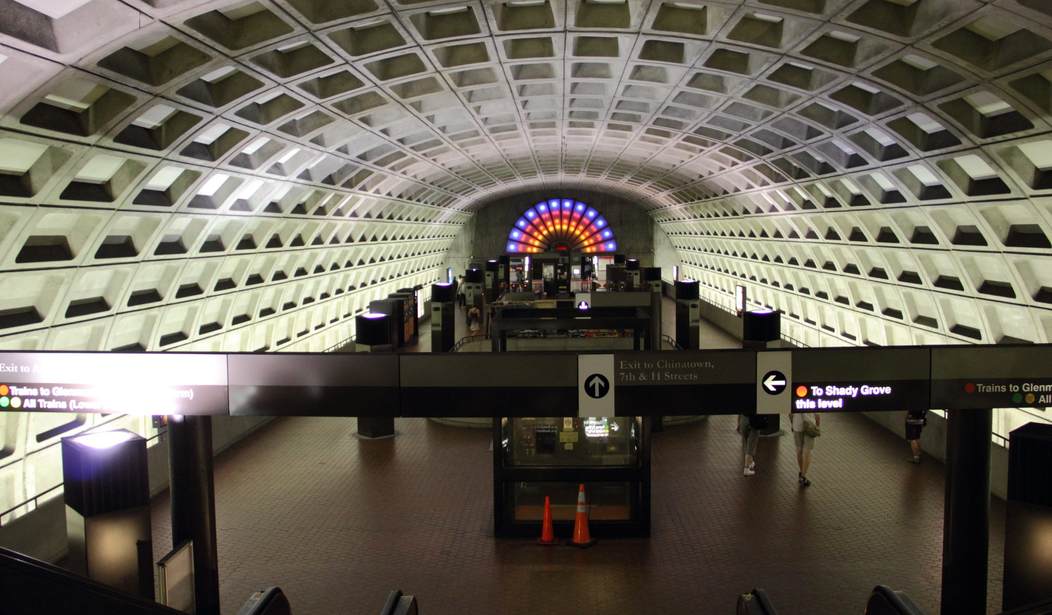As any resident of Washington, D.C. knows, the Metro is in serious trouble. Costs are ballooning, delays are frequent, cars often catch fire, and fewer and fewer people are rolling the dice on the Metro rails. Even so, Metro workers voted to strike recently, and the looming union action threatens to shut down the daily commute in the nation’s capital.
One of Metro’s five unions voted to strike earlier this month, with 94 percent of members favoring direct action. Last Wednesday, the union delivered its demands to local lawmakers. Ironically, the union demanded Metro follow the law — while voting to strike, an action expressly forbidden by its founding document.
“Our demand is simple: get [General Manager Paul] Wiedefeld to follow the law, abide by the collective bargaining agreement, and bargain in good faith on all matters under his obligation,” the union wrote. “We are well aware of the legality of a strike, and the consequences of such an action. Our willingness to strike should demonstrate to you how terrible the morale is for workers at Metro and the lengths we are wiling to go to restore the integrity of his system and our work.”
Given the overall situation, the impending strike seems more a cry for attention from a petulant child than the urgent plea of a truly wronged individual.
As Sean Kennedy, a visiting fellow at the Maryland Public Policy Institute, pointed out in The Washington Post, Metro employees already enjoy handsome compensation. Employee pay and benefits take up a whopping 71 percent of Metro’s operating budget, and that doesn’t include the $2.8 billion in unfunded liabilities for union employees’ retirement and health care.
According to Metro’s own data, the average salary and benefits compensation for an employee exceeds $109,000 — $20,000 more than the average D.C. area worker. That gap only widens when you compare Metro employees to their compatriots in similar jobs across the District. Private-sector bus drivers earn only an average of $59,000 in pay and benefits, while Metrobus drivers earn almost twice that.
Overtime compensation, excessive and often abused, cost Metro more than $83 million last year, averaging out to more than $7,800 per overtime-eligible employee. These employees also accrue pension benefits relative to overall pay (including overtime), an odd practice out of line with most labor rules.
To make matters worse, Metro’s “services” costs — $300 million last year — went to hiring outside contractors to do some of the same work the union employees are supposed to be doing.
D.C. residents are well familiar with the escalators being shut down for weeks at a time, the hated practice of “single tracking,” and the constant presence of employees who seem to have nothing to do. Extremely high labor costs and a seeming sense of entitlement among workers help explain why Metro seems so inefficient.
Despite government subsidies, Metro fares keep increasing. Commuters are choosing other options, driving ridership down to pre-2000 levels, despite the region’s 30 percent population growth in recent years. With crowded roads — and municipalities actually erasing lanes on busy thoroughfares — and more economic activity, Metro’s demand should be on the upswing, but the opposite is true.
The D.C. Metro is the most expensive major city transportation (rail and bus) system in the country, costing $4.03 per rail mile and $4.63 per bus mile to operate per passenger. D.C. area taxpayers — and U.S. taxpayers — cover 77 percent of the Metro’s $3.2 billion annual operating cost.
Metro has demanded an additional $25 billion over the next decade, but General Manager Wiedefeld — perhaps embarrassed by this large sum — has insisted the system can get by with $15.5 billion, raised through — get this — new taxes.
Now, Metro union employees have decided to strike, after a week of rising tensions. Labor complains about management’s moves to reassign custodians to Metro stations, outsourcing some work, performing background checks on workers (imagine that!), and threatening to punish workers who participated in a July 12 “late-out” that slowed down traffic and delayed bus service across the D.C. area. Oh, and the employees don’t want management to be able to fire safety inspectors for lying.
The union laid out no fewer than 14 grievances, conveniently ignoring Metro’s high compensation for the area.
Luckily for commuters in the nation’s capital, striking is illegal, so a work stoppage could prompt a federal judge to order employees back on the job and lead to hefty fines for the union. Perhaps that explains why the union has been hesitant to actually accomplish the strike, despite labor’s convincing vote for it.
For these reasons, Kennedy has called for Congress to revise the compact, abolish the collective bargaining rights of Metro employees, and sanction striking unions.
This situation, like the years-long scandals at the Department of Veterans Affairs (VA), illustrates the glaring need for civil service reform across the federal government, and in the capital’s public transit system. A central problem is the very idea of public sector unions, which are inherently political (as the Supreme Court ruled in Janus v. AFSCME), as they involve public employees squeezing money from the people they are intended to serve.









Join the conversation as a VIP Member